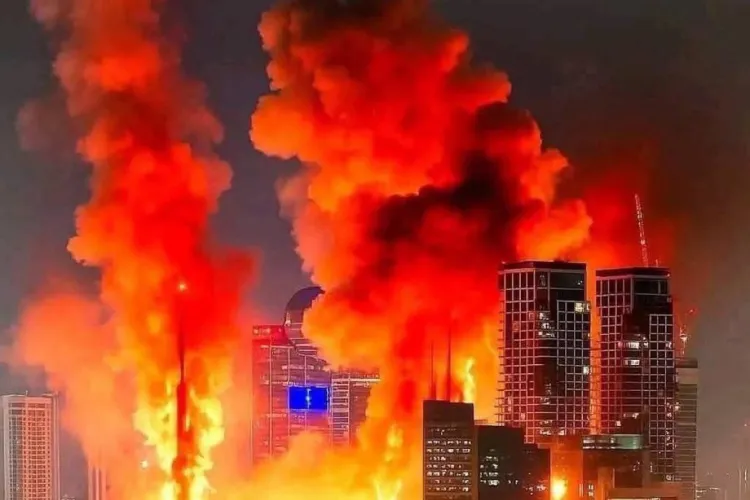
Dubai
Israel launched blistering attacks on the heart of Iran's nuclear and military structure on Friday, deploying warplanes and drones previously smuggled into the country to assault key facilities and kill top generals and scientists -- a barrage it said was necessary before its adversary got any closer to building an atomic weapon.
Iran retaliated late on Friday by unleashing scores of ballistic missiles on Israel, where explosions flared in the skies over Jerusalem and Tel Aviv and shook the buildings below.
In a second round of attacks, sirens and explosions, possibly from Israeli interceptors, could be heard booming in the sky over Jerusalem early on Saturday. The Israeli military urged civilians, already rattled by the earlier wave of missiles, to head to shelters.
New wave of Iranian missiles launched
The Iranian outlet Nour News, which has close links with the paramilitary Revolutionary Guard, said a wave was being launched. Associated Press journalists in Tel Aviv could see at least two Iranian missiles hit the ground, but there was no immediate word of casualties.
A hospital in Tel Aviv treated seven people wounded in the second Iranian barrage; all but one of them had light injuries. Israel's Fire and Rescue Services said they were injured when a projectile hit a building in the city.
Meanwhile, the sound of explosions and Iranian air-defence systems firing at targets echoed across central Tehran shortly after midnight on Saturday, and an Associated Press reporter could hear air-raid sirens near their home.
Iran's semi-official Tasnim news agency is reporting a fire at Tehran's Mehrabad International Airport, with a video posted on X of a column of smoke and orange flames rising from what the outlet said was the airport.
Iran's Supreme Leader Ayatollah Ali Khamenei said in a recorded message on Friday: "We will not allow them to escape safely from this great crime they committed." Iran's UN ambassador said 78 people were killed and more than 320 wounded in Israeli attacks.
Israel's paramedic services said 34 people were wounded in the barrage on the Tel Aviv area, including a woman who was critically injured after being trapped under rubble. In Ramat Gan, east of Tel Aviv, an Associated Press journalist saw burned out cars and at least three damaged houses, including one where the front was nearly entirely torn away.
US ground-based air-defence systems in the region were helping to shoot down Iranian missiles, said a US official who spoke on the condition of anonymity to discuss the measures.
Israel's ongoing airstrikes and intelligence operation and Iran's retaliation raised concerns about an all-out war between the countries and propelled the region, already on edge, into even greater upheaval.
Israel had long threatened such a strike, and successive American administrations sought to prevent it, fearing it would ignite a wider conflict across the Middle East and possibly be ineffective at destroying Iran's dispersed and hardened nuclear programme.
But a confluence of developments triggered by Hamas' October 7, 2023, attack -- plus the reelection of US President Donald Trump -- created the conditions that allowed Israel to finally follow through on its threats. Israeli Prime Minister Benjamin Netanyahu said the US was informed in advance of the attack.
On Thursday, Iran had been censured by the UN's atomic watchdog for not complying with obligations meant to prevent it from developing a nuclear weapon.
Countries in region condemn Israel's attack
Countries in the region condemned Israel's attack, while leaders around the globe called for immediate deescalation from both sides.
The UN Security Council held an emergency meeting on Friday afternoon at Iran's request. In a letter to the council, Iran's Foreign Minister Abbas Araghchi called the killing of its officials and scientists "state terrorism" and affirmed his country's right to self-defence.
Israel's military said about 200 aircraft were involved in the initial attack on about 100 targets. Its Mossad spy agency positioned explosive drones and precision weapons inside Iran ahead of time, and used them to target Iranian air defences and missile launchers near Tehran, according to two security officials who spoke on the condition of anonymity.
It was not possible to independently confirm the officials' claims.
Among the key sites Israel attacked was Iran's main nuclear-enrichment facility in Natanz, where black smoke could be seen rising into the air. It also appeared to strike a second, smaller nuclear-enrichment facility in Fordo, about 100 kilometres (60 miles) southeast of Tehran, according to an Iranian news outlet close to the government that reported hearing explosions nearby.
Israel said it struck a nuclear-research facility in Isfahan, too, and said it destroyed dozens of radar installations and surface-to-air missile launchers in western Iran. Iran confirmed the strike at Isfahan.
Israel military spokesman Brig. Gen. Effie Defrin said the Natanz facility was "significantly damaged" and that the operation was "still in the beginning".
UN nuclear chief Rafael Grossi told the Security Council that the above-ground section of the Natanz facility was destroyed. He said all the electrical infrastructure and emergency power generators were destroyed, as well as a section of the facility where uranium was enriched up to 60 percent.
ALSO READ: Mustafa A. Barbhuiya's journey from remote Assam village to top US pathologist
The main centrifuge facility underground did not appear to have been hit, but the loss of power could have damaged the infrastructure there, he said.
